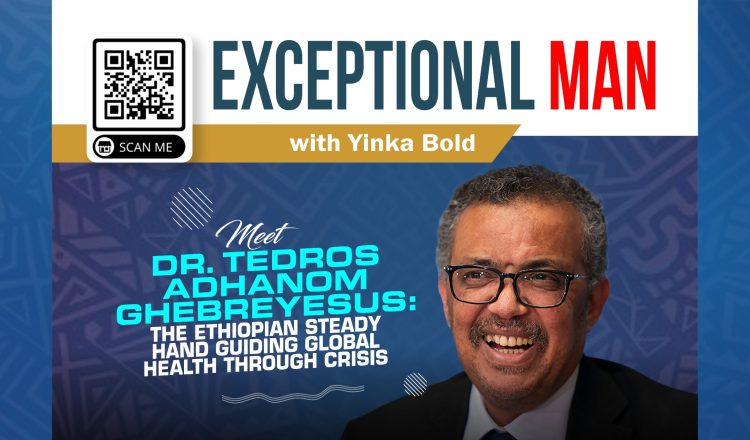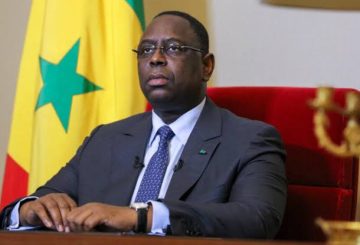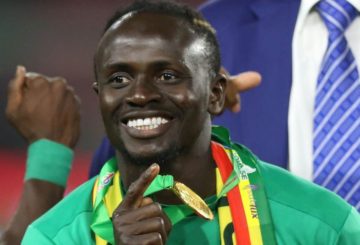Dr. Tedros Adhanom Ghebreyesus will complete his commitment as WHO Director-General on 30 June 2027. He was elected at the 70th World Health Assembly, the first WHO Director-General to have been put forward as a candidate by his government, and after nomination, Member States of WHO then elected him as the 85th Director-General of WHO. Tedros is the Chair of the Partnership for Maternal, Newborn and Child Health and Chair of the Roll Back Malaria Partnership, and is a member of the Global Leaders of the Commission on COVID-19. Dr. He took up the post of WHO Director-General on 1 July 2017, and plans to continue the legacy of the Co-Champions and is also an advocate for the Global Action Plan for Healthy Lives and Well-Being for All, and the Decade of Healthy Ageing.
Born on March 3, 1965, in Asmara (now Eritrea), Tedros grew up in war-torn Ethiopia. His early exposure to the devastating effects of diseases like malaria had a profound impact on him, especially after the death of his younger brother from a preventable disease. This experience fueled his determination to work in public health. Tedros earned a Bachelor of Science in Biology from the University of Asmara, followed by a Master of Science in immunology of infectious diseases from the London School of Hygiene & Tropical Medicine. He later completed a Ph.D. in community health from the University of Nottingham, focusing on the relationship between dams and malaria transmission
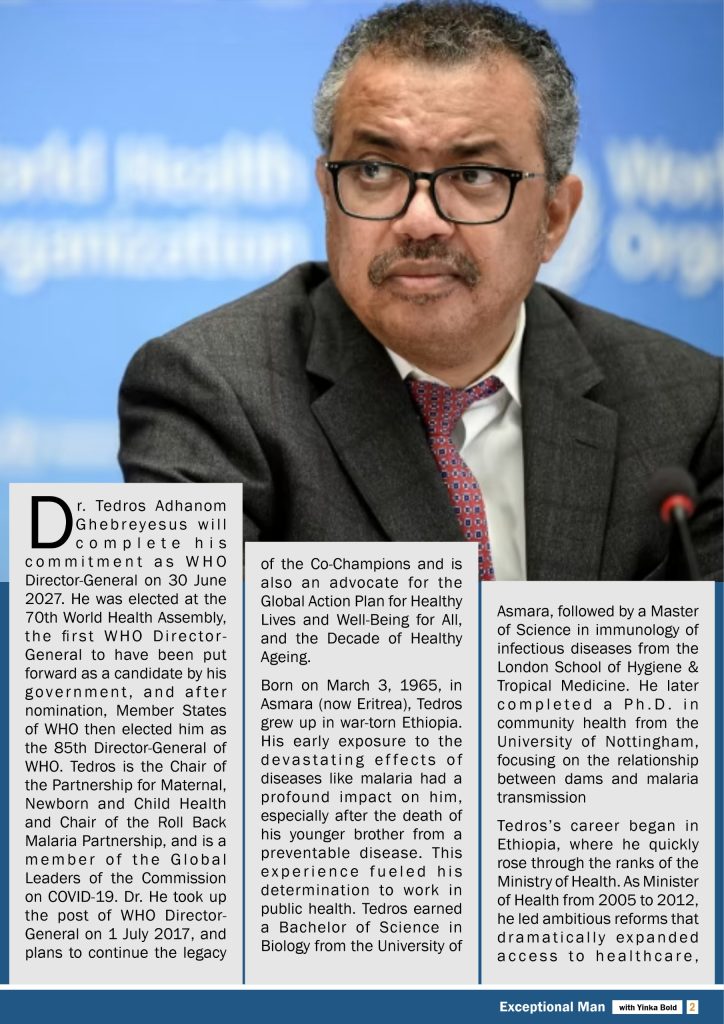
Tedros’s career began in Ethiopia, where he quickly rose through the ranks of the Ministry of Health. As Minister of Health from 2005 to 2012, he led ambitious reforms that dramatically expanded access to healthcare, reducing child mortality and the prevalence of diseases like HIV and tuberculosis. His approach centered on strengthening primary healthcare services and decentralizing health systems to improve access in rural areas. He then served as Ethiopia’s Minister of Foreign Affairs, gaining valuable experience in global diplomacy
In 2017, Tedros became the first African Director-General of the WHO. The African Union supported his appointment, and he took on the challenge of leading the organization at a time when the world was increasingly grappling with global health crises. Tedros’s tenure coincided with major global health emergencies, including Ebola outbreaks and, most significantly, the COVID-19 pandemic. His hands-on approach and emphasis on strengthening the health system defined his leadership style, earning praise and criticism from various quarters.
Under Tedros’s leadership, the WHO launched several key initiatives. His most notable policy is the push for Universal Health Coverage (UHC), which aims to ensure that every person, regardless of location or income, has access to quality healthcare without suffering financial hardship. Tedros has also focused on improving emergency preparedness, spearheading initiatives such as the COVID-19 Vaccine Global Access (COVAX) program, which sought to ensure fair vaccine distribution globally. His leadership has reinforced the WHO’s role in responding to health emergencies and advancing health equity.
Tedros’s experience as Ethiopia’s Foreign Minister equipped him with diplomatic skills crucial for navigating international health governance. He has consistently advocated for stronger international cooperation, especially in pandemic preparedness and response. Despite political tensions and criticism, particularly from former U.S. President Donald Trump, who accused the WHO of mismanaging the COVID-19 crisis, Tedros maintained his stance on science-driven policies. His diplomatic efforts were instrumental in rebuilding relationships, as seen when the U.S. rejoined the WHO under President Joe Biden.
Tedros’s tenure has not been without challenges. The COVID-19 pandemic exposed global inequalities in healthcare, and the WHO’s handling of the crisis was scrutinized, with accusations of slow response times and alleged favoritism toward China. Tedros was also criticized for his perceived leniency toward authoritarian regimes, and his ties to Ethiopia’s Tigray People’s Liberation Front (TPLF) led to accusations of bias during Ethiopia’s internal conflict. Despite these controversies, Tedros remained focused on his broader mission to improve global health systems
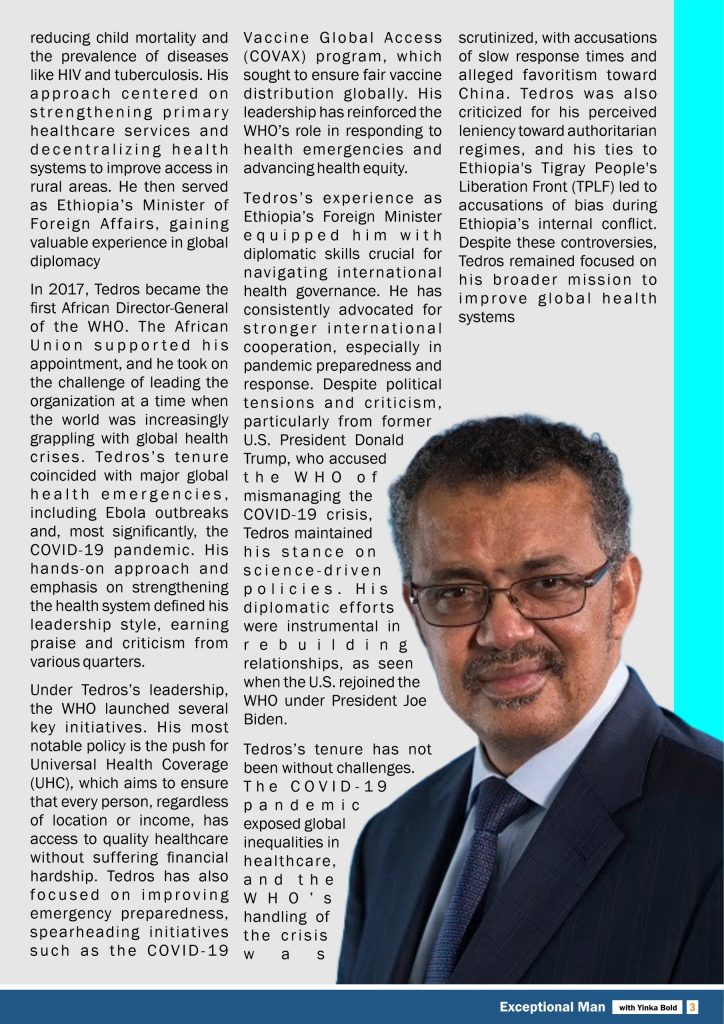
Tedros’s impact on global health is undeniable. His focus on health equity and emergency preparedness has led to significant reforms within the WHO. The organization’s stronger role in coordinating global responses to pandemics and health crises can largely be attributed to its leadership. The push for universal health coverage, vaccine equity, and mental health awareness are just a few of the transformative initiatives that have shaped his tenure. Despite political headwinds, Tedros has continued to push for a more inclusive and resilient global health system.
Read more: The Nigerian Japa Syndrome: Myths and Truths (I)
Dr. Tedros’ legacy as second-term WHO Director-General and champion of global health is already well-established. His leadership during the most turbulent period in recent global health history has been marked by impactful initiatives and policies, ensuring that health systems worldwide are equipped to meet current and future challenges. With a focus on equity, preparedness, and health diplomacy, Tedros continues to redefine global health governance for the modern world..
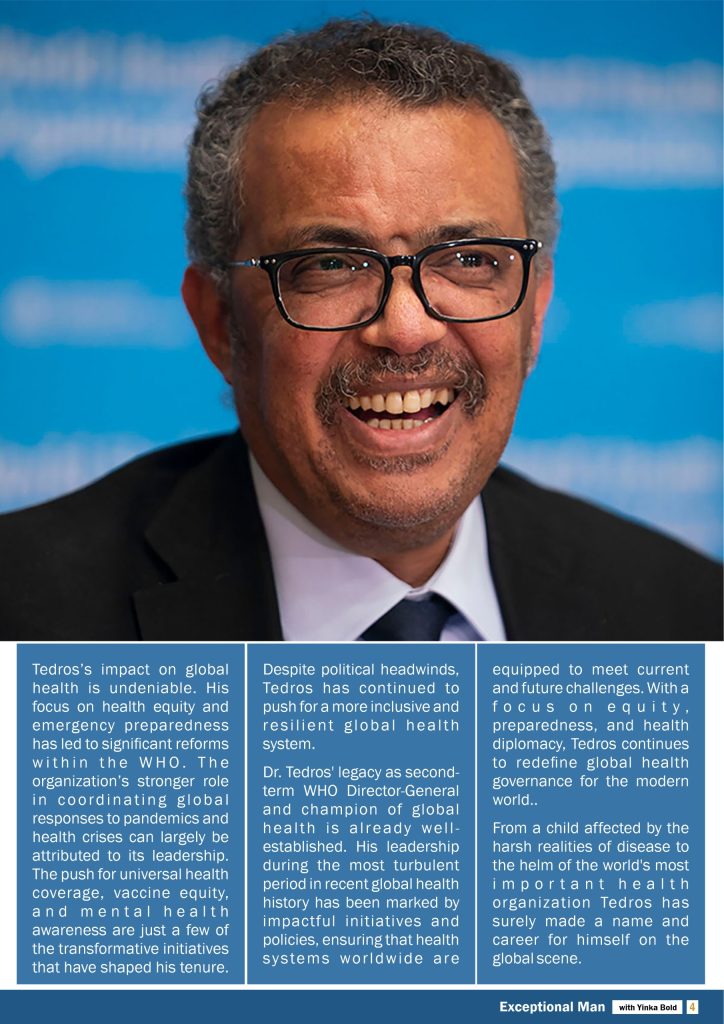
From a child affected by the harsh realities of disease to the helm of the world’s most important health organization Tedros has surely made a name and career for himself on the global scene.


